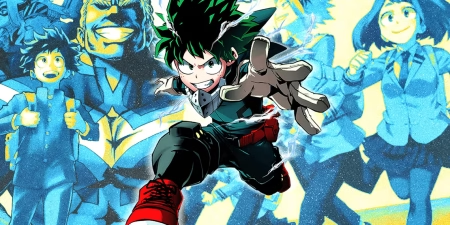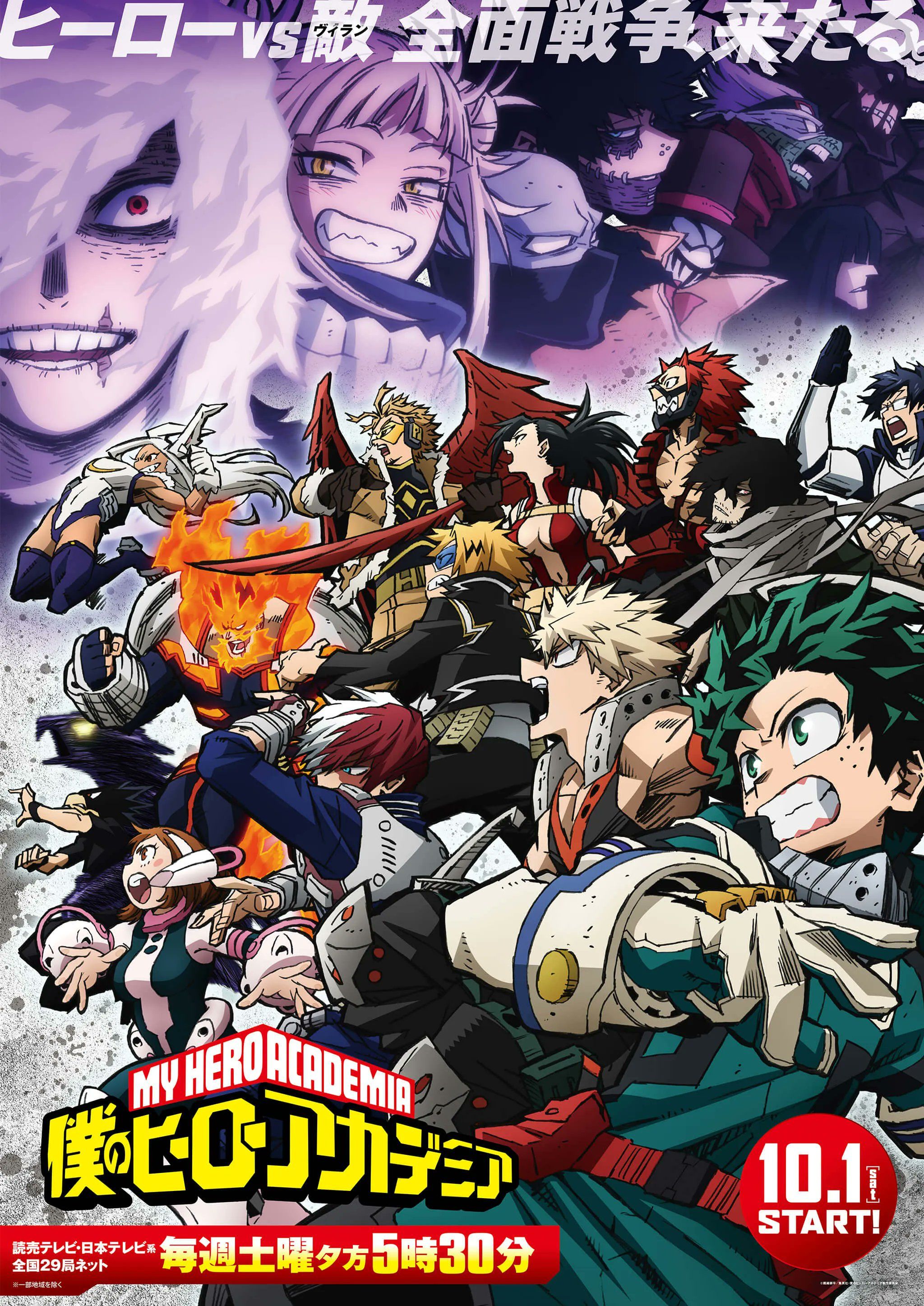My Hero Academia Betrayed Its Own Themes When it Gave Deku a Quirk
- 03-Mar-2024, 17:09
- 0 Comments
- 7 views

It's understandable how some fans might feel that Deku's character development in My Hero Academia deviates from the theme of self-made heroes. While Deku does undergo significant growth and achieves great success through his hard work and determination, there are moments where his progression may seem more driven by external factors or plot convenience.
Deku's journey from being Quirkless to becoming a hero with one of the most powerful Quirks is undeniably impressive, but his frequent encounters with powerful mentors and inheritances of powerful Quirks might diminish the sense of self-reliance that the series aims to portray. Additionally, the concept of "plot armor," where a character is seemingly protected from harm or failure for the sake of the story's progression, can sometimes detract from the authenticity of Deku's struggles and achievements.
Furthermore, the idea that Deku may be fighting for someone else's destiny raises questions about the agency of his character and whether his actions truly reflect his own desires and motivations. While it's natural for characters in a narrative to face challenges and receive assistance along their journey, it's important for their growth and achievements to feel earned and authentic.
Ultimately, while Deku's character arc may have its flaws, it's important to recognize the complexity of storytelling and character development in My Hero Academia. Despite any inconsistencies or criticisms, the series continues to resonate with audiences and offers valuable themes and messages about heroism, perseverance, and the pursuit of one's dreams.
Certainly! Here's a revised version with optimizations for indexing and adherence to Google's guidelines:
---
In the world of shonen anime, it's widely acknowledged that the action hero often enjoys a degree of narrative protection to ensure they don't meet a premature demise or fail to save the day. Fans of shonen anime tend to accept this narrative convention as long as the hero faces and conquers significant challenges along their journey to ultimate victory—a testament to the audience's suspension of disbelief.
"My Hero Academia" initially exemplified this trope through its protagonist Deku, born without any Quirk abilities and forced to fight tooth and nail for every inch of progress. He compensated for his lack of inherent abilities by meticulously studying and analyzing the Quirks of others, thus becoming a tactically astute combatant who never underestimated the powers at play. Moreover, he dedicated himself to rigorous physical training for a full year just to be deemed worthy of inheriting the formidable One For All Quirk from his mentor, All Might. Deku's relentless efforts, coupled with his innovative combat techniques like Shoot Style and Full Cowling, underscored his determination to make the most of his newfound power.
However, Deku's meteoric ascent as the next symbol of peace cannot solely be attributed to his personal endeavors, thereby challenging the core themes of self-made heroism that "My Hero Academia" ostensibly promotes. In essence, the narrative bestowed upon Deku the necessary power to thrive as a shonen protagonist, which, while consistent with themes of altruism and communal support, raises thematic questions about the hero's agency and autonomy. While there may be in-universe justifications for the transference of the One For All Quirk, it dilutes Deku's narrative arc as a self-made success story. Some have even posited that Deku might have been a more compelling character had he remained Quirkless, relying instead on his intellect and resourcefulness to carve out a path as a hero or vigilante.
At this juncture, One For All ceases to function merely as a narrative device and morphs into Deku's de facto plot armor, augmenting his existing status as a shonen protagonist. Deku not only possesses the strength necessary to vanquish his arch-nemesis, Tomura Shigaraki, but he is also uniquely positioned as the sole individual capable of thwarting Shigaraki's cataclysmic ambitions. Consequently, Deku's eventual triumph is virtually assured, irrespective of the inherent uncertainties associated with shonen narratives. The stakes are further heightened by the implicit understanding that the stability of Japanese society hinges upon Deku's success, thereby rendering failure an untenable outcome. However, this reliance on external power undermines Deku's narrative arc as a self-actualized hero, reducing him to a mere conduit for the will of One For All.
Critics of "My Hero Academia" might argue that Deku finds himself embroiled in a conflict not entirely of his making, thereby casting him as a pawn rather than a proactive agent of change. He not only inherits the mantle of One For All from his predecessors but also inherits their longstanding vendetta against the supervillain All For One and, more recently, All For One's protege, Tomura Shigaraki. Consequently, Deku finds himself thrust into a preexisting struggle, devoid of any personal stake save for his desire to redeem Tenko Shimura, the innocent soul potentially ensnared within Shigaraki's malevolence. In essence, Deku's trajectory as a hero is predetermined by the legacy of One For All, depriving him of agency and relegating him to the role of a mere instrument in a larger, intergenerational conflict.
Shonen anime risks undermining its core ethos when heroes are bestowed with their destinies rather than forging them through personal agency and struggle.
It's a rarity in the realm of shonen manga and anime for the hero's destiny and requisite power to be handed to them on a silver platter, so when it does occur, it's hard to miss. Deku might stand out as a prime example of a supposedly self-made hero being more akin to a puppet of fate, but he's not alone in this regard. Even revered classics like the "Big Three" aren't immune to this trope, with Masashi Kishimoto's "Naruto" being a notable example.
Much like Deku, protagonist Naruto Uzumaki began his journey with next to nothing, devoid of family or friends to lean on. Naruto endured as an outcast, despised by his own village, yet rather than succumb to bitterness or seek vengeance, he aspired to become a respected ninja, seeking validation and acknowledgment of his worth. While it was his dream, the narrative ultimately gifted him that dream, eroding the notion of Naruto as a self-made individual.
To his credit, Naruto diligently honed his skills, mastering techniques like the Rasengan and even concocting the unorthodox yet surprisingly effective Sexy Jutsu as a prankster's tool. However, Naruto possessed his own version of plot armor akin to One For All: the power of Kurama, the nine-tailed fox. Born as a jinchuriki, Naruto harbored immense power within him, a factor that contributed to his status as a marginalized underdog. This became particularly apparent during the Chunin Exam Arc when Naruto triumphed over Neji Hyuga not solely through his own prowess, but with the aid of Kurama's chakra, rendering Kurama's influence akin to a game cheat. Such instances undermine the narrative of a self-made hero ascending from zero to hero through their own efforts.
The revelation that Naruto was a descendant of Asura Otsutsuki, destined to clash with the descendant of Indra Otsutsuki, namely Sasuke Uchiha, further reinforced the notion of Naruto being a child of destiny, a pivotal factor in his journey. Ironically, this realization validated Neji's earlier beliefs about the constraints of fate upon ninja.
In the end, the most compelling anime heroes are those who carve out their destinies with their own hands, eschewing the trappings of preordained fate. From characters like Thorfinn to Ochaco to Denji, their stories resonate because they embody the ethos of determination and agency, forging their paths through sheer grit and resolve.
Thankfully, both the shonen and seinen anime worlds abound with heroes who epitomize the theme of self-made success in various ways. These characters make the most of their abilities and tirelessly strive for victory, all while charting their own paths toward the future. Despite encountering numerous setbacks and facing seemingly insurmountable obstacles, their journey to success through sheer determination is far more gratifying than being handed victory as the chosen one.
"My Hero Academia" exemplifies this theme not through its protagonist Deku, but rather through his classmates, particularly his new comrades Ochaco Uraraka and his shonen-style rival, Shoto Todoroki. While they may have been blessed with Quirks from birth, they independently chart their own destinies and define their values. Ochaco emerges as the true underdog in "My Hero Academia," a compassionate and resilient young woman who climbs the ranks of heroism through sheer determination, driven by her desire to financially support her parents as a pro hero. Her goals are self-imposed, and each victory she achieves is hard-earned, accompanied by valuable lessons learned from her defeats. Similarly, Shoto, despite being groomed for greatness by his father, rejects his predetermined path and fiercely pursues his own destiny as a pro hero, striving to assert his individuality and independence.
Other anime series also effectively portray this theme, such as "Vinland Saga," wherein protagonist Thorfinn Karlsefni undergoes profound introspection, realizing that vengeance and bloodshed do not lead to fulfillment. Instead, he resolves to forge his own path to freedom after enduring slavery on Ketil's farm, aspiring to establish a new settlement, Vinland, where he can find peace and purpose through his own efforts. Similarly, "Chainsaw Man's" protagonist Denji, though progress may be slow, remains steadfast in his pursuit of personal goals, persisting through both triumphs and setbacks, all of which are entirely of his own making.
In contrast, "One Piece's" Monkey D. Luffy may possess hints of destiny through his Joy Boy persona and Gear 5's awakening, but his destiny is vague at best: to liberate people from oppression. However, this was a future Luffy had already chosen for himself, driven by his unwavering commitment to freedom and his personal quest to become the Pirate King. Luffy's ambition to live autonomously and uncover the fabled One Piece treasure reflects his determination to carve out his own legacy, with his transformation into the embodiment of Nika, the sun god, serving as a means to that end. Ideally, "My Hero Academia's" narrative could have similarly empowered Deku to pursue his own goals, with One For All serving merely as a tool to aid him on his journey rather than an obligation to fulfill another's legacy.

Izuku has dreamt of being a hero all his life—a lofty goal for anyone, but especially challenging for a kid with no superpowers. That’s right, in a world where eighty percent of the population has some kind of super-powered “quirk,” Izuku was unlucky enough to be born completely normal. But that’s not enough to stop him from enrolling in one of the world’s most prestigious hero academies.